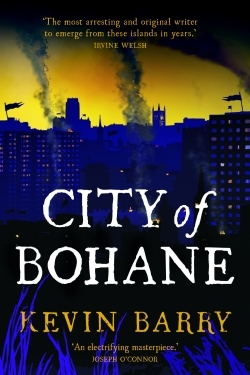City of Bohane
Bohane may be a made-up place, or it may be based on an actual crossroads “out the tip-end o’” Ireland, but it’s already on the literary map of fine writing. With City of Bohane, Kevin Barry makes landscape as much a presence as any of the characters.
And what an odd, troubling, endearing lot they are: there’s Martin Broderick, known as the Gant, a big, hard, but gentle relic of a man; there’s Logan Hartnett, referred to as the Long Fella, a tall albino with an air of wasted elegance; and there’s Macu, a green-eyed vixen and the love of both men’s life. Around this “good auld tangle o’ romance” swirl plots of revenge as the city of Bohane prepares for “a succession ruck.”
The blood feud brewing between the Northside Risers and the Back Trace preoccupies the characters and their sidekicks. Much like West Side Story, with the Jets and the Sharks, these Irish lads are of a piece with the bogs and gorsey wilds of the Big Nothin’ that has kept the western peninsula cut off from the world beyond. People obey whoever rules the Back Trace, an evil labyrinth of streets filled with grog shops, noodle joints, fetish parlors, needle alleys, dream salons, and power haunts.
At the moment, it’s Logan who holds sway over the Hartnett Fancy. Set in the futuristic 2054, it could just as easily be 1954 given the fluidity of time and the “many hooked lure” of nostalgia for long ago, when Gant, Macu, and Logan were all young, the Gant had the running of the Back Trace, and Macu was by his side. Now she is married to Logan, who keeps her in thrall along with the rest of his fiefdom.
Part of the genius of this novel is having it narrated by an off-stage owner of an antiquarian video parlor, whose reasonable tone of amused tolerance plays counterpart to the often foul, always colorful “double-jointed lingo” of the locals. While the brogue may mystify some readers (“took ya for a gommey lackteen”), the language is inventive. That is, of course, the other part of Barry’s genius: the sentences are sinuous, the images dense, and the voices as singular as the Bohane creation itself.
Barry’s stories have appeared in The New Yorker, and his short story collection won the Rooney Prize in 2007. While this first novel is not without flaws (Macu is never developed beyond an alluring memory), it is bound to appeal to fans of Roddy Doyle’s Commitments, Carson McCullers’ Ballad of the Sad Cafe, and Richard Price’s Clockers.
Reviewed by
Trina Carter
Disclosure: This article is not an endorsement, but a review. The publisher of this book provided free copies of the book to have their book reviewed by a professional reviewer. No fee was paid by the publisher for this review. Foreword Reviews only recommends books that we love. Foreword Magazine, Inc. is disclosing this in accordance with the Federal Trade Commission’s 16 CFR, Part 255.

